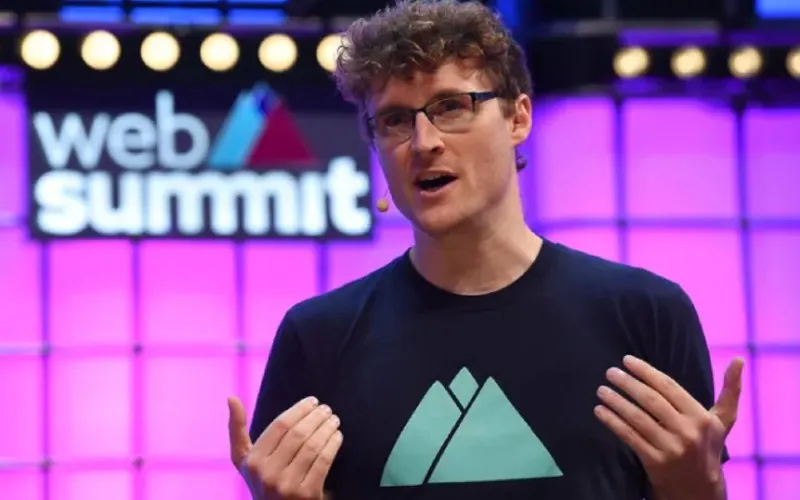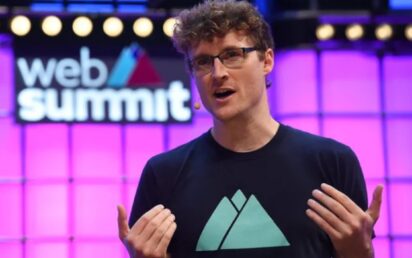Every year it has attracted thousands of the world’s leading tech lights to Dublin and encouraged start-ups to take their first tentative steps into the business world.
Yet Paddy Cosgrave’s Web Summit is moving away from his home city after a five-year run, something which has attracted criticism from local authorities.
Set up by Cosgrave, a graduate of Trinity College Dublin, in 2010, the first conference drew 400 people who wanted to hear from tech experts and included a pub crawl around Dublin’s streets.
Later events, by comparison, attracted tens of thousands of attendees from up to 134 countries and included speakers from the likes of Pixar, Twitter and Microsoft.
Cosgrave is moving Web Summit to Lisbon after deciding that it has outgrown its home.
“My co-founders and I wanted to create something that was different to other conferences that we had attended,” says Cosgrave.
“We tried with a small team in 2010 but had no idea we would have had 42,000 attendees come to Dublin in 2015.”
Where Web Summit shines is through its own use of tech, from the design of the exhibition space through to the use of algorithms that take into account who you are and who you might benefit from being in a meeting with.
It brings together start-ups, investors and influencers to create networking opportunities, recognising that tech companies can innovate and grow better when they mix with like-minded individuals.
“We fixate on helping our attendees find the right people and ideas from millions of possible connections and conversations,” says Cosgrave.
“In other words, we believe that the desire for human-to-human interaction is still incredibly powerful.”
While taking a successful event away from the place where it has thrived may sound risky, Cosgrave says there is no trepidation as they have proved that the model works wherever it is run.
From a team of three, the organisation now has more than 150 staff at its Dublin headquarters, so will retain a presence there in any case.
The 2015 event also attracted more than 2,000 volunteers, many of whom flew in from abroad just for the conference, and it will no doubt garner the same support wherever it is run.
The success in Dublin has also inspired the launch of Collision in the US, RISE in Hong Kong and Web Summit’s sister event SURGE in India in February 2016.
Cosgrave does not believe he is leaving Dublin in the lurch by moving to Portugal.
“With some minor tweaks we’ve had huge success and growth,” Cosgrave says. “Dublin is a magical city with a thriving tech community, home to many global tech giants such as Google and Facebook.
“Some amazing start-ups have exhibited at Web Summit and are now doing extremely well, for example Trustev, which recently sold for $42m.
“I think that is evidence enough that Ireland is growing as a tech hub and will continue to grow, and who’s to say that we won’t hold another event here?
“We have more than 150 staff in our HQ in Dublin so it will always be at the centre of everything we do.”
Lisbon’s thriving start-up community coupled with its transport links and hotels made it an obvious choice as Web Summit’s new home, according to Cosgrave.
With a new venue that can hold 80,000 attendees it will provide space for the next chapter in the event’s growth.
“I’ve noticed the Lisbon tech and start-up community growing from strength-to-strength with new innovative ideas and fast-growing companies thanks to a number of business incubators such as Startup Lisboa,” says Cosgrave, adding that Portuguese businesses have been a familiar sight at past events.
“There has also been an increase in European venture capitalists and investors looking to Lisbon as a tech hub, for example the launch of Portugal Ventures, a government-supported investor fund.
“The initial contract is for three years with the option to extend for a further two; at the moment we are focused on making Web Summit 2016 a success and are obsessing about details to make the experience as best we can for our attendees.”
Cosgrave believes the future is bright for the European tech scene as a whole, saying it offers everything – albeit in a more dispersed way than Silicon Valley.
Highlights of the 2015 Web Summit included virtual reality (VR) and augmented reality (AR) and he believes these areas, along with robotics and artificial intelligence (AI), are most likely to get hot in 2016 and 2017.
“Entrepreneurs are building companies which are aiming to disrupt almost every aspect of modern life and business – from finding autos and rooms to how to get dressed in the morning,” he says.
“These companies are often using advanced computing power, instantaneous data analysis and sophisticated software to provide services to users that go beyond the internet and deliver in the real world.
“So while Google is essentially a software company, companies like Uber or Airbnb are hybrid software companies or Internet+ companies.
“The entrepreneurs are relentlessly focused on enhancing real world services and experiences by augmenting available software and infrastructure.
“This means that traditional sectors of the economy are ripe for an upgrade, with digital innovation delivering new products, services and business models – and more choice for consumers.”


